TJX Cos Bundle
Who Really Owns TJX Companies?
Understanding the ownership of The TJX Companies, Inc. is key to grasping its market strategy and future growth. From its origins as a subsidiary of Zayre Corp. to its current status as a retail giant, TJX's ownership structure has dramatically evolved. This evolution has shaped its ability to adapt and thrive in the competitive retail landscape.
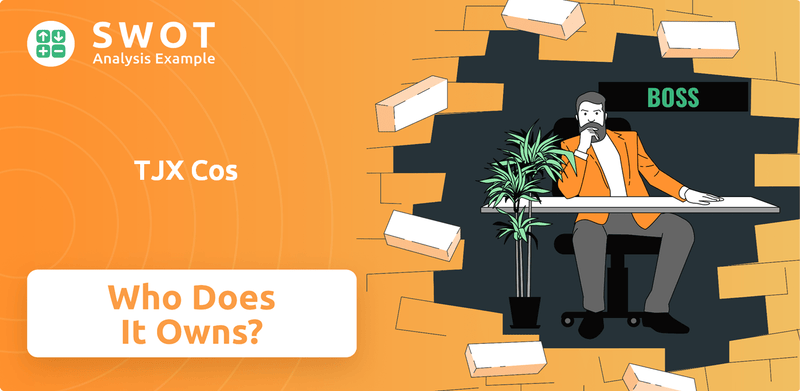
This deep dive into TJX Cos SWOT Analysis will uncover who owns TJX, from the initial founders to today's major shareholders. We'll explore the impact of this ownership on the company's financial performance, including its impressive US$54.22 billion in revenue reported in 2024. Discover the answers to questions like: Who is the CEO of TJX Cos? Is TJX Cos a publicly traded company? and, How to invest in TJX Cos stock?
Who Founded TJX Cos?
The origins of The TJX Companies, Inc., and its ownership structure, are rooted in the establishment of T.J. Maxx in 1977. The initial vision came from Bernard (Ben) Cammarata, who was recruited by Zayre Corp. to develop an off-price retail chain, leading to the opening of the first stores in Massachusetts.
In June 1987, Zayre Corp. formalized The TJX Companies as a subsidiary, incorporating T.J. Maxx, Hit or Miss, and Chadwick's of Boston. The company's evolution reflects a strategic shift from its parent company, Zayre, to a standalone entity focused on the off-price retail model.
Following a restructuring in 1989, TJX became the successor company, with Ben Cammarata as CEO and President. The transition involved a move from a corporate parent to a publicly traded entity, with shares listed on the New York Stock Exchange. The initial funding came from Zayre Corp., highlighting the parent company's role in launching the off-price retail venture.
Ben Cammarata spearheaded the development of T.J. Maxx under Zayre Corp.
Initially, TJX operated as a subsidiary of Zayre Corp.
TJX became the successor company after a Zayre Corp. reorganization in 1989.
Funding for TJX as a separate entity originated from Zayre Corp.
The company transitioned to a publicly traded entity, listed on the NYSE.
The restructuring aimed to concentrate on the profitable off-price retail model.
Understanding the evolution of TJX Cos ownership is crucial for investors. Initially, the TJ Maxx owner was Zayre Corp., which later spun off TJX Cos parent company. The company's structure shifted from a subsidiary to a publicly traded entity, with shares available on the TJX Cos stock market. The early stages involved Ben Cammarata, who played a key role in the company's founding. The transformation reflects a strategic shift to focus on the off-price retail sector. To learn more about the company's growth, you can read about the Growth Strategy of TJX Cos.
- The company's headquarters are located in Framingham, Massachusetts.
- The company's subsidiaries include T.J. Maxx, Marshalls, HomeGoods, and others.
- As of early 2024, the company's market capitalization is approximately $100 billion.
- In fiscal year 2024, the company reported net sales of over $54 billion.
TJX Cos SWOT Analysis
- Complete SWOT Breakdown
- Fully Customizable
- Editable in Excel & Word
- Professional Formatting
- Investor-Ready Format
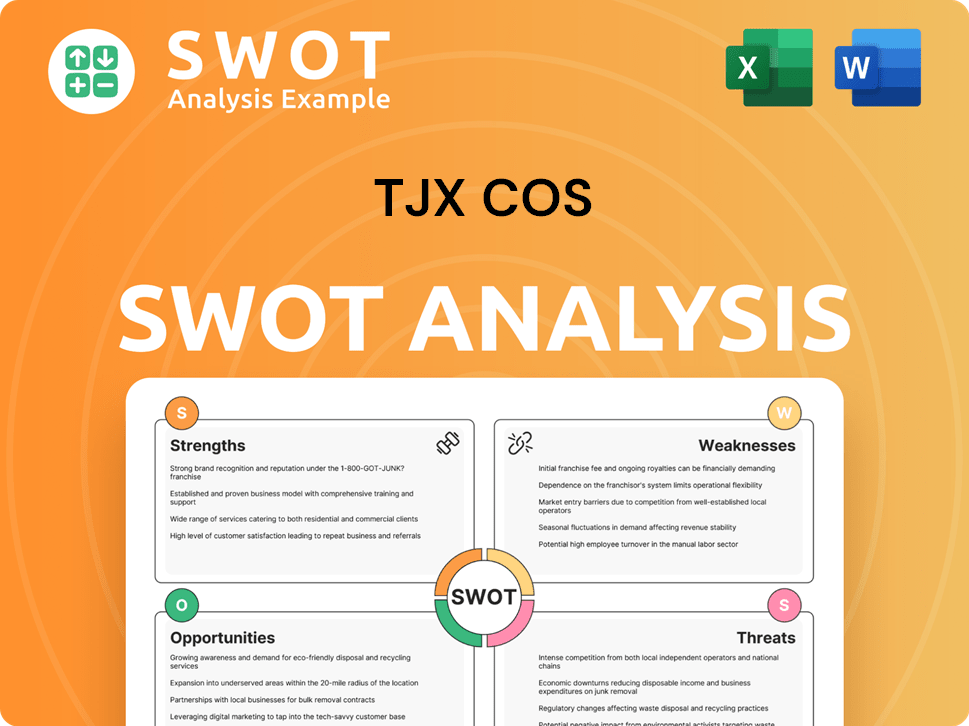
How Has TJX Cos’s Ownership Changed Over Time?
The ownership structure of The TJX Companies, Inc. has evolved since its public debut in 1989. As a publicly traded entity on the NYSE, its ownership is primarily dispersed among institutional investors, mutual funds, index funds, and individual shareholders. This structure reflects a typical model for large, established corporations, with ownership dynamics influenced by market performance and strategic decisions.
Since its inception, the company has grown significantly, impacting its ownership landscape. Strategic moves, such as the acquisition of Winners Apparel of Canada in 1990 and the launch of HomeGoods in the U.S. in 1992, have shaped its operational scope and, consequently, its appeal to investors. The expansion into the UK and Ireland with TK Maxx in 1994 further broadened its market presence, contributing to its overall value and investor interest. The company's sustained financial performance, with net sales reaching $56.4 billion for the fiscal year ended February 1, 2025, has solidified its position and attracted consistent investor attention.
| Ownership Category | Percentage (May 2025) | Shares Held (Approximate) |
|---|---|---|
| Institutional Shareholders | 88.66% | Significant |
| Insiders | 0.51% | Limited |
| Retail Investors | 10.83% | Variable |
As of May 2025, institutional shareholders collectively own 88.66% of TJX. BlackRock, Inc. is the largest individual shareholder, holding 100.61 million shares, representing 9.02% as of June 2025. Other major institutional investors include Vanguard Group Inc. with 99.31 million shares, State Street Corp., and Wellington Management Group Llp. Vanguard Group Inc. increased its holdings by an additional 578,948 shares in the fourth quarter of 2024, bringing its total to approximately 99.31 million shares valued at over $11.99 billion. Northern Trust Corp. also significantly raised its holdings by 15.2% in the fourth quarter of 2024, acquiring an additional 1.84 million shares. For more insights, explore the Competitors Landscape of TJX Cos.
The majority of TJX Cos is owned by institutional investors, indicating strong market confidence.
- BlackRock and Vanguard are among the largest shareholders.
- The company's consistent financial performance attracts sustained investor interest.
- Strategic acquisitions have shaped its operational and ownership landscape.
TJX Cos PESTLE Analysis
- Covers All 6 PESTLE Categories
- No Research Needed – Save Hours of Work
- Built by Experts, Trusted by Consultants
- Instant Download, Ready to Use
- 100% Editable, Fully Customizable
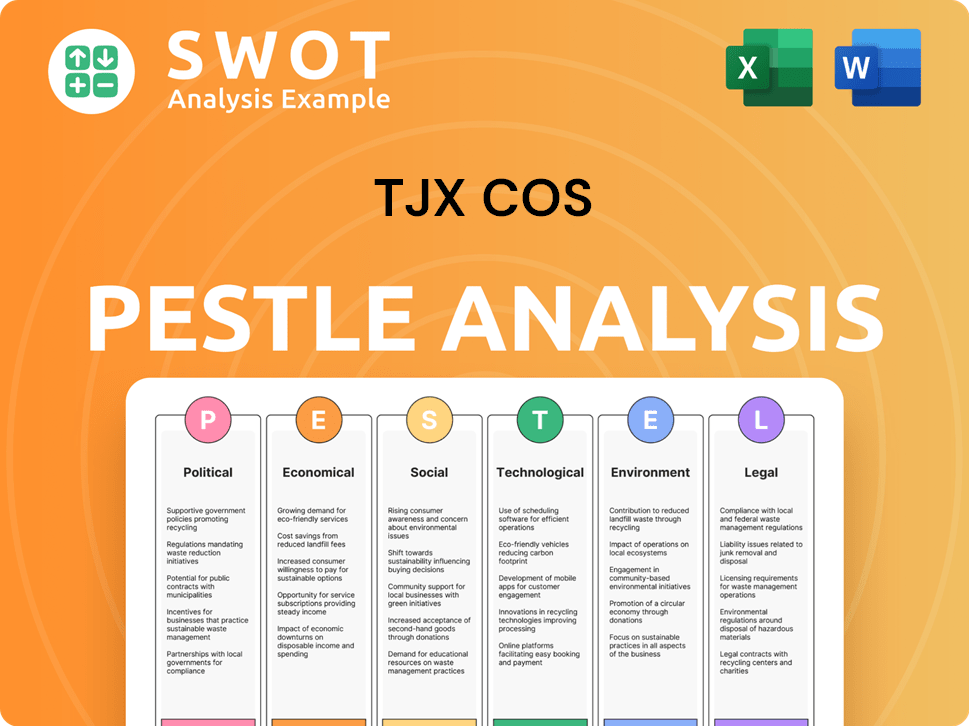
Who Sits on TJX Cos’s Board?
The current board of directors of The TJX Companies, Inc. (addressing the question of TJX Cos ownership) is pivotal in steering the company's strategic direction and overseeing its governance. As of February 2025, the board is led by Executive Chairman Carol Meyrowitz, with Ernie Herrman serving as Chief Executive Officer and President, also a director. John Klinger holds the position of Senior Executive Vice President and Chief Financial Officer. The board's composition includes a blend of executive and independent directors, ensuring a balance of perspectives in decision-making.
The board includes independent directors such as José B. Alvarez, Alan M. Bennett (Lead Independent Director), Amy B. Lane, Jackwyn Nemerov, and Charles F. Wagner, Jr. (information as of April 2024). According to TJX's Corporate Governance Principles, at least two-thirds of the board members must be independent, in compliance with NYSE standards. This structure aims to maintain robust corporate governance and protect shareholder interests, reflecting the company's commitment to transparency and accountability. For more details, you can read a Brief History of TJX Cos.
| Director | Title | As of |
|---|---|---|
| Carol Meyrowitz | Executive Chairman of the Board | February 2025 |
| Ernie Herrman | Chief Executive Officer and President | February 2025 |
| John Klinger | Senior Executive Vice President and Chief Financial Officer | February 2025 |
Regarding voting rights, holders of TJX's Common Stock are entitled to one vote per share. Director nominees are elected if the 'for' votes exceed the 'against' votes, except in contested elections where a plurality vote applies. Shareholders do not have cumulative voting rights. Proxy access provisions allow shareholders owning at least 3% of outstanding shares for at least three years to include director nominees in the company's proxy statement. The maximum number of shareholder nominees is the greater of two or 20% of the directors. The recent shareholder meeting on June 10, 2025, saw the approval of all board director nominees and the ratification of PricewaterhouseCoopers LLP as the independent auditor for fiscal year 2026, indicating strong shareholder confidence.
Shareholders have significant influence through their voting rights in TJX Cos stock. Each share of Common Stock grants one vote. Proxy access allows shareholders to nominate directors, provided they meet specific ownership criteria.
- One vote per share for Common Stock holders.
- Director nominees are elected by a majority vote.
- Proxy access for shareholders owning at least 3% of shares.
- Shareholders approved all director nominees at the June 10, 2025 meeting.
TJX Cos Business Model Canvas
- Complete 9-Block Business Model Canvas
- Effortlessly Communicate Your Business Strategy
- Investor-Ready BMC Format
- 100% Editable and Customizable
- Clear and Structured Layout
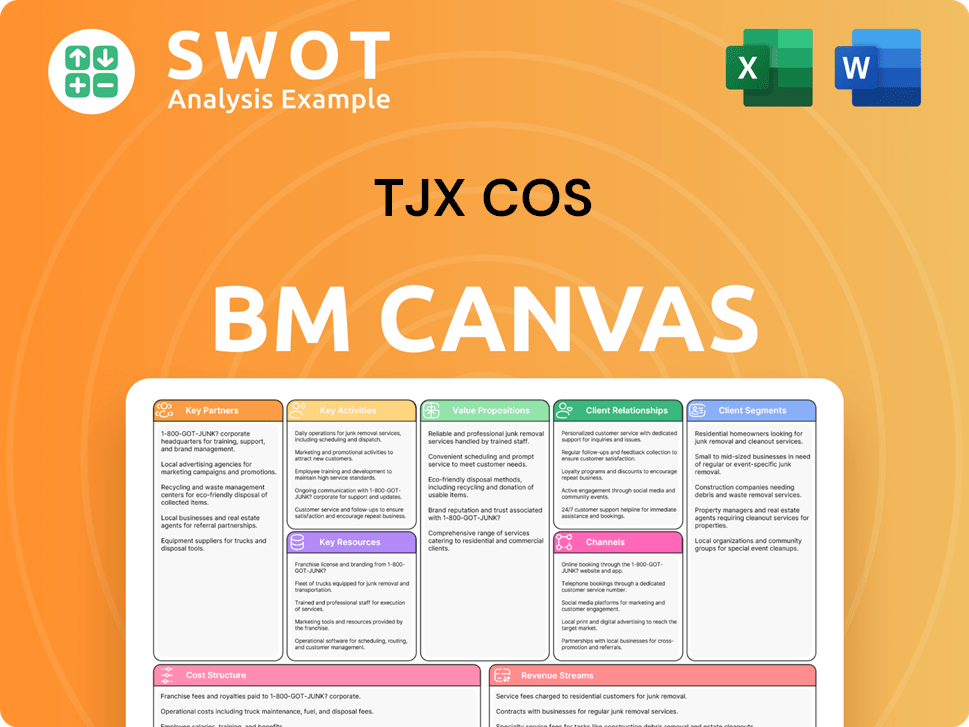
What Recent Changes Have Shaped TJX Cos’s Ownership Landscape?
Over the past few years, The TJX Companies, Inc. has actively returned value to its shareholders. For the fiscal year that ended on February 1, 2025, the company repurchased approximately $2.5 billion of its stock, which resulted in the retirement of around 22.3 million shares. Furthermore, it distributed $1.6 billion in shareholder dividends. Looking ahead to the fiscal year ending February 1, 2026, TJX plans to repurchase between $2.25 billion and $2.5 billion in stock. In March 2025, the company announced a quarterly dividend of $0.375 per share, which was paid in March 2025. This action continues its pattern of dividend growth, with 27 dividend increases over the last 28 years, showing a compound annual growth rate of 20%.
The ownership structure of TJX reflects industry trends, with institutional investors holding a significant portion of the company. As of May 2025, institutional ownership accounted for 88.66% of the company. While founder dilution is typical for mature public companies, Bernard Cammarata, the founder of T.J. Maxx, retired as Chairman of the Board in June 2015. He remains involved as Founder and Executive Advisor. Leadership succession has been planned, with Ernie Herrman becoming CEO in January 2016, succeeding Carol Meyrowitz, who transitioned to Executive Chairman of the Board.
TJX continues to expand strategically, including plans to enter Spain with its TK Maxx banner in early 2026. The company's strong financial performance, including a 4% increase in consolidated comparable store sales for fiscal year 2025, with net sales reaching $56.4 billion, highlights its resilience. Analysts project TJX's revenue to increase to $17.9 billion by March 2026, representing a 27.72% increase. To understand more about its strategic moves, you can explore the Growth Strategy of TJX Cos.
| Metric | Value | Year |
|---|---|---|
| Stock Repurchases | $2.5 billion | Fiscal Year 2025 |
| Shares Retired | 22.3 million | Fiscal Year 2025 |
| Shareholder Dividends | $1.6 billion | Fiscal Year 2025 |
| Institutional Ownership | 88.66% | May 2025 |
| Net Sales | $56.4 billion | Fiscal Year 2025 |
Institutional investors hold a significant portion of TJX Cos stock.
TJX Cos is the parent company of TJ Maxx and Marshalls.
TJX Cos has a history of returning value to its shareholders through buybacks and dividends.
Institutional investors are the primary owners of TJX Cos stock.
TJX Cos Porter's Five Forces Analysis
- Covers All 5 Competitive Forces in Detail
- Structured for Consultants, Students, and Founders
- 100% Editable in Microsoft Word & Excel
- Instant Digital Download – Use Immediately
- Compatible with Mac & PC – Fully Unlocked
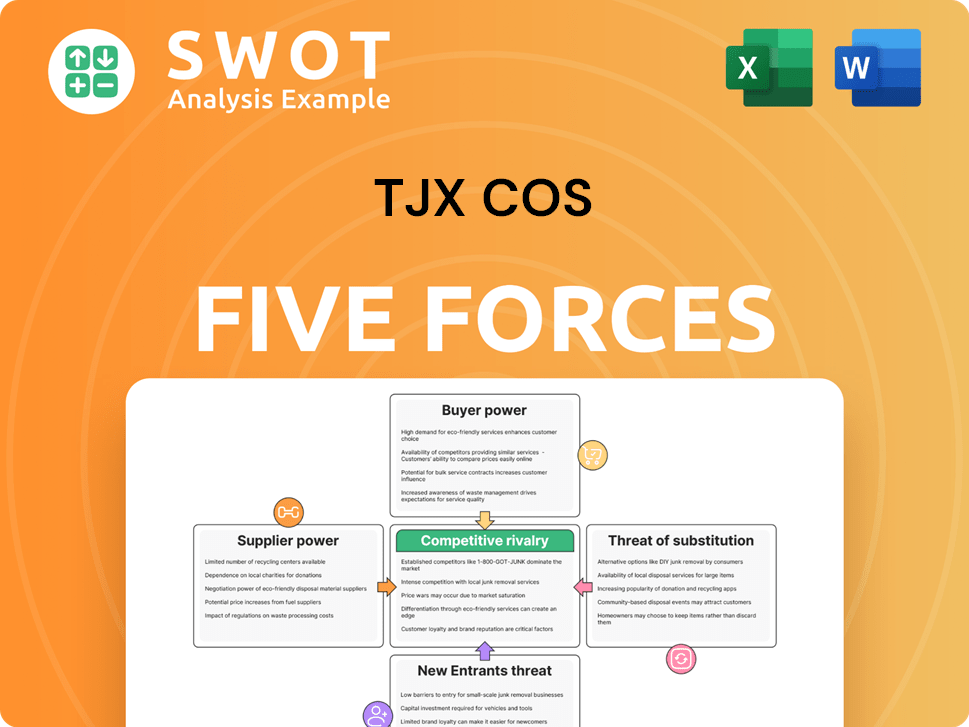
Related Blogs
- What are Mission Vision & Core Values of TJX Cos Company?
- What is Competitive Landscape of TJX Cos Company?
- What is Growth Strategy and Future Prospects of TJX Cos Company?
- How Does TJX Cos Company Work?
- What is Sales and Marketing Strategy of TJX Cos Company?
- What is Brief History of TJX Cos Company?
- What is Customer Demographics and Target Market of TJX Cos Company?
Disclaimer
All information, articles, and product details provided on this website are for general informational and educational purposes only. We do not claim any ownership over, nor do we intend to infringe upon, any trademarks, copyrights, logos, brand names, or other intellectual property mentioned or depicted on this site. Such intellectual property remains the property of its respective owners, and any references here are made solely for identification or informational purposes, without implying any affiliation, endorsement, or partnership.
We make no representations or warranties, express or implied, regarding the accuracy, completeness, or suitability of any content or products presented. Nothing on this website should be construed as legal, tax, investment, financial, medical, or other professional advice. In addition, no part of this site—including articles or product references—constitutes a solicitation, recommendation, endorsement, advertisement, or offer to buy or sell any securities, franchises, or other financial instruments, particularly in jurisdictions where such activity would be unlawful.
All content is of a general nature and may not address the specific circumstances of any individual or entity. It is not a substitute for professional advice or services. Any actions you take based on the information provided here are strictly at your own risk. You accept full responsibility for any decisions or outcomes arising from your use of this website and agree to release us from any liability in connection with your use of, or reliance upon, the content or products found herein.